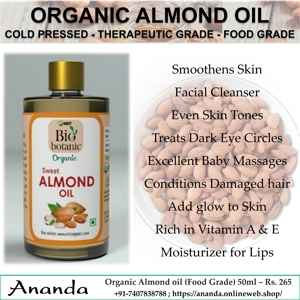






BOTANICAL NAME : Simmondsia chinensis
• Jojoba oil is the liquid produced in the seed of the Simmondsia chinensis (Jojoba) plant, a shrub.
• The oil makes up approximately 50% of the jojoba seed by weight. The terms "jojoba oil" and "jojoba wax" are often used interchangeably but are technically different. Jojoba wax refers to the raw hydrocarbon extracted from the seeds and is composed mostly of triglyceride esters; hydrolysis of this (with the removal of glycerol) leaves Jojoba oil, which is composed mostly of freefatty acids.
• The oil has a higher cloud point and better cosmetic properties.
BENEFITS
• Jojoba oil is used as a replacement for whale oil and its derivatives, such as cetyl alcohol
• Jojoba oil is found as an additive in many cosmetic products, especially those marketed as being made from natural ingredients. In particular, such products commonly containing jojoba are lotions and moisturizers, hair shampoos and conditioners. The pure oil itself may also be used on skin, hair, or cuticles
• Jojoba oil is a fungicide, and can be used for controlling mildew
• joba biodiesel has been explored as a cheap, sustainable fuel that can serve as a substitute for petroleum diesel
METHOD OF EXTRACTION
Cold Pressed
SUGGESTED USE
Food and Cosmetic use
CERTIFICATIONMRT gives the product which is grown under the stringent organic standards of NPOP, NOP, and EU certification by LACON, GERMANY
TYPICAL ANALYSIS
Palmitic acid- 0.3%
Palmitoleic acid- 0.3%
Stearic acid- 0.2%
Oleic acid-9.3%
Eicosenoic acid- 76.7%
Erucic acid- 12.1%
Lignoceric acid- 0.1%
Nervonic acid- 1.0%